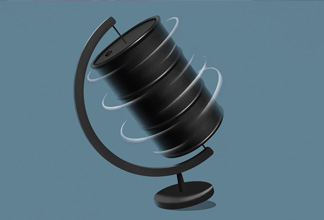Stop Procrastinating: An Expert Tells Us How
Written by Tamar Satov
Published on August 7, 2019
minute read
Share:
If you had a long list of tasks you wanted to complete this summer, but haven't gotten to it, join the club. There are legitimate reasons many of us procrastinate on activities we feel are important — like waiting until the annual RRSP deadline is looming before making any contributions, or filing income tax returns at the last minute — even though it's not in our best personal or financial interests to do so.
That's no surprise to Tim Pychyl, associate professor of psychology and head of the Procrastination Research Group at Carleton University in Ottawa. "Everything about money is scary," he says. "It's completely understandable why someone might put off these tasks."
That's because according to research by Pychyl and others, negative emotions such as fear, anxiety, resentment and boredom are the reasons why we procrastinate. It has nothing to do with poor time management, lack of will power or being lazy.
"You could be using a great time management app or to-do list, but when you get to the point in the day that you've scheduled that task you say, 'I don't feel like it — I don't want to do this," says Pychyl. "We think avoiding the task is going to make us feel better. But just like we think eating a bag of cookies or buying a new pair of shoes will make us feel better, that feeling is short-lived and comes back to bite us in the butt."
"Biology is not destiny. People can learn to manage negative emotions."
Indeed, studies on emotional intelligence have found that the ability to regulate emotion and tolerate frustration makes a person less prone to procrastination. And digital images from MRI scans show that chronic procrastinators have a larger amygdala — the "fight or flight" centre of the brain responsible for emotions and survival instincts. When faced with an unsavoury task, these people's amygdalas tell them to run away from it, in the same way they would flee from a predator.
So, does that mean some of us just need to resign to the fact that we will always procrastinate? Absolutely not, says Pychyl: "Biology is not destiny. People can learn to manage negative emotions."
Here are the steps Pychyl recommends to help you get through your financial to-do list on a timely basis.
Face your emotions
While you may not enjoy doing your taxes, it's important to confront that fact. "You have to recognize there's a good chance you'll never feel like doing it," says Pychyl. "We can't suppress our emotions, but we can develop a non-judgmental awareness of our emotions to gain more control over our behaviour."
Switch your focus to a small action
Once you're aware of a negative emotion related to a particular task, redirect your attention away from "feeling" toward "doing." The key, says Pychyl, is to think about the tiniest next action you could take if you were going to move forward with the task (even though you don't want to). For example, getting the box where you store your tax paperwork and receipts and putting it on the kitchen table.
"Make the threshold that small," he says. You're much more likely to follow through on "move box" than you are on "do taxes." Once the box is on the kitchen table, your next small action could be, "sort paperwork into categories," and so on. "Even a little bit of action on a goal will lead to an upward spiral of progress," he says.
Use a pre-commitment tool
To prevent the mad scramble before the RRSP contribution deadline, you could set up fund transfers ahead of time to have a portion of your paycheque automatically invested every month. Of course, the star procrastinators among us will then be facing what Pychyl calls "second order procrastination" — putting off the pre-commitment action. "You think, yes, I should set up an automatic transfer. But then that becomes the task you procrastinate on," he says.
In that case, you need to go back to the previous step, and find the next small action you can take. So, maybe it starts with just logging in.
Another pre-commitment device is to create an external consequence that may spur you into action. For instance, someone could get a friend or family member to be their accountability buddy and agree that if the task isn't completed, they will owe their loved one a week's worth of kitchen cleanup or handling the carpooling to the kids' extracurricular activities.
Don't beat yourself up
Finally, cut yourself some slack if you do succumb to procrastination. In one of Pychyl's studies, those who forgave themselves for procrastinating were less likely to procrastinate on the same task in the future than those who lacked self-compassion.
Do you procrastinate? How do you manage it? Leave a comment* to share your thoughts.
This article was featured in our special issue, as seen in the Globe and Mail. Download the full magazine HERE.
*Comments only enabled for clients. Not a client? You can open and account or get a free practice account. If you are a client, sign in to read or comment.
**This article was updated on Feb. 11, 2020.
RBC Direct Investing Inc. and Royal Bank of Canada are separate corporate entities which are affiliated. RBC Direct Investing Inc. is a wholly owned subsidiary of Royal Bank of Canada and is a Member of the Canadian Investment Regulatory Organization and the Canadian Investor Protection Fund. Royal Bank of Canada and certain of its issuers are related to RBC Direct Investing Inc. RBC Direct Investing Inc. does not provide investment advice or recommendations regarding the purchase or sale of any securities. Investors are responsible for their own investment decisions. RBC Direct Investing is a business name used by RBC Direct Investing Inc. ® / ™ Trademark(s) of Royal Bank of Canada. RBC and Royal Bank are registered trademarks of Royal Bank of Canada. Used under licence.
© Royal Bank of Canada 2025.
Any information, opinions or views provided in this document, including hyperlinks to the RBC Direct Investing Inc. website or the websites of its affiliates or third parties, are for your general information only, and are not intended to provide legal, investment, financial, accounting, tax or other professional advice. While information presented is believed to be factual and current, its accuracy is not guaranteed and it should not be regarded as a complete analysis of the subjects discussed. All expressions of opinion reflect the judgment of the author(s) as of the date of publication and are subject to change. No endorsement of any third parties or their advice, opinions, information, products or services is expressly given or implied by RBC Direct Investing Inc. or its affiliates. You should consult with your advisor before taking any action based upon the information contained in this document.
Furthermore, the products, services and securities referred to in this publication are only available in Canada and other jurisdictions where they may be legally offered for sale. Information available on the RBC Direct Investing website is intended for access by residents of Canada only, and should not be accessed from any jurisdiction outside Canada.
Explore More

The Hidden Costs of Being Single
How single Canadians can build wealth on their own terms
minute read

What Investors Can Learn from Hockey Star and RBC Olympian Sarah Nurse
Nurse's path to the podium reveals how preparation, planning and practice can turn potential into a golden opportunity
minute read

Crude Questions? A Look at Canada’s Oil Economy
What you need to know about Canada’s oil industry
minute read
Inspired Investor brings you personal stories, timely information and expert insights to empower your investment decisions. Visit About Us to find out more.







